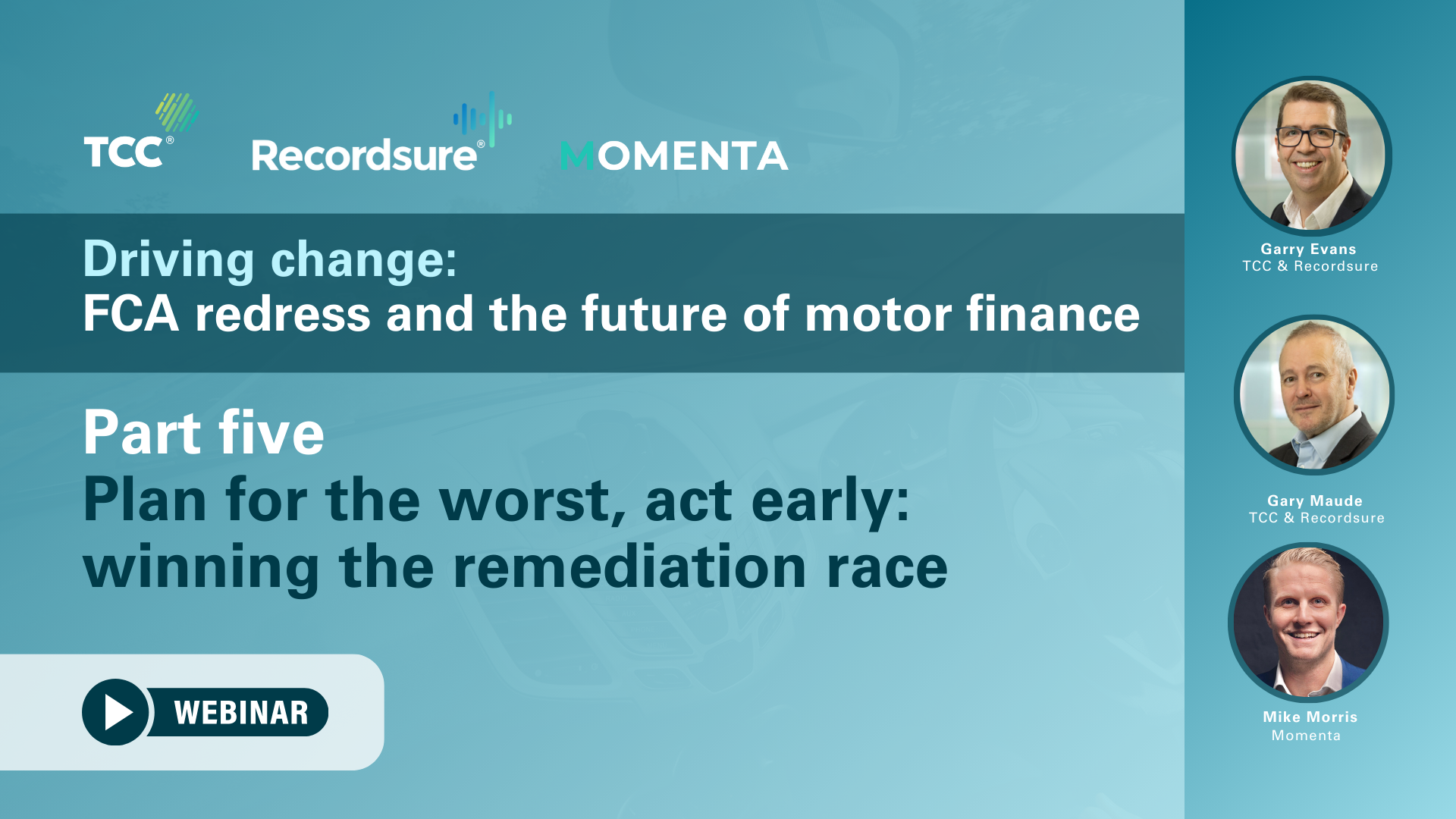Resourcing is set to become one of the biggest challenges in delivering the upcoming motor finance remediation and redress programme. In this section of our recent webinar, Mike Morris Head of Operations at Momenta shares how the Supreme Court ruling has shifted the balance from high volume automated redress towards more complex, bespoke complaint handling – and why this change could push demand for skilled case handlers far beyond current supply.
From procurement pressures to the risk of all firms “fishing in the same pool” for resource, the conversation explores the operational realities firms must now factor into their planning.
Garry Evans- Chief Product Officer and Chief Commercial Officer for TCC Group
I think the piece that Gary called out there on kind of resource is going to be a really interesting, challenge for the industry. But I’m not the best person to, to talk about that. Mike, you were all primed and ready to go, weren’t you? Based on what we thought was going to happen. So what is your expectation now on firstly, how the remediation would have looked operationally before the ruling and then what has changing given what we have heard?
Mike Morris- Head Of Operations at Momenta
Thanks, Gary. I think that probably the main changes around, previously were expecting a also redress scheme that would cover, DCA cases and potentially none DCA cases, and that would be relatively straightforward in terms of describing a simple process that could be automated using technology to push through maybe 75-80% upwards of that population through, a workflow system that completes the process steps from tracing through to redress through to contacting customers.
For the populations outside of that, there would be some exceptions. So potentially where there’s key data that’s missing from the customer’s file, collections activity might have taken place. Vulnerability flags, deceased customers. Now those would go down to sort of a non happy path you’d need a more tailored and bespoke process that human resources would need to need to be working.
I think the main change that we can see is that the volume of cases that are in scope for that automated redress population is lower, but due to the issues that the Supreme Court has raised around unfair practices, it does mean there is now a potentially a higher volume of cases that sit outside auto redress, and those case types are going to be more complex to review. We know through CMC behaviour with existing clients and providers that the CMCs will make it more complex.
They will find additional complaint points to put into, into those cases that would need to be triaged and identified. And it’s a more nuanced decision making process. So you would be the ultimate result of that, is you would need some more experienced resources to be able to process that. I think the point there is that the redress cost to firms, in terms of the payments they’re making to customers is lower. But overall the potential for the remediation, the processing cost of the remediation, is likely to be higher.
Garry Evans- Chief Product Officer and Chief Commercial Officer for TCC Group
That’s really helpful, Mike. Thank you. Now, since the ruling on the 3rd, we’ve seen some significant movement from a number of motor finance creditors to start engaging in procurement exercises, ahead of the kind of complete clarity of scope and process on the FCA. And it seems to me, based on a feel that you’re getting access to the right type of resource may well be in very high demand and very difficult if everybody is trying to do it at the same time.
I want to run a quick, third poll, if that’s okay, to see how this audience is feeling about their readiness. What stage of planning are you at for what will obviously kind of inevitably result in remediation and redress project. I do wonder whether we’re going to get a similar split of opinions, as we have done on the last two questions. Interesting. Whilst we’ve haven’t had a large number of respondees on this one. More than half not even started and kind of most of the rest of you are kind of at the initial preparation stage, we are certainly seeing, I guess we would, because of the conversations we’ve been having, more of the people in the bottom half of that scheme with a number of RFPs currently being worked on, and a couple of clients of ours who have been in this for a while.
Well that’s great. Now, we’ve talked a little bit, about resourcing but, Mike, there’s a lot of delivery organisations ready to move on these projects already. So be at the big four, some of the big legal firms with servicing arms, business process outsources, and kind of more specialised compliance consultancies and professional services business. Do they all have this kind of individual pool of qualified resources to deliver these projects so they can be kind of spread out across the industry, or are they all fishing in the same associate pool?
Mike Morris- Head Of Operations at Momenta
I think the typical types of resources needed for some of the more straightforward DCA process, you’re looking at entry level case handlers and the market is quite full in terms of that level of experience. But when you start getting into the complex work, looking at the unfair practices, it is more specialised and requires more experience in terms of assessing the fairness and customer circumstances and details around the sale.
We canforesee that there is going to be a higher demand for those resources, you know, and all motor finance firms with a back book of these agreements will be affected and there’ll be lots of remediation projects up and running in the next 18 months. So we can foresee a bit of a shortage in the next 18 months of that resource. And whether that then impacts the cost of that may present a bit of a risk to the delivery of some projects.
There’s a couple of ways to mitigate that. An alternative that we have available is an offshore solution. We have a base in South Africa that has experienced resources available to be deployed at a reduced cost. Another strategy firms that maybe haven’t started preparation yet is around, taking a look at their policies and procedures and understanding the suitability of the detail behind it.
Obviously the detail behind the redress scheme is yet to be confirmed, but work can be done to bring some of those compliant and practices up to date. Having robust and thorough policies will mean that businesses are able to scale their operations much faster and potentially be able to use less experienced resources if those resources are supported by strong, detailed procedures.
Ready to see the full webinar – you can watch the full 30 minutes here.
With more complaints requiring nuanced, case-by-case assessment, the industry faces an 18-month period where experienced remediation resources will be in high demand and potentially short supply. Firms that start preparing now, by reviewing policies, tightening procedures and considering alternative delivery models such as offshore teams, will be better positioned to respond at scale when the FCA’s redress scheme is finalised.
If you want to secure the right skills, design efficient processes, and minimise operational risk, TCC, Recordsure and Momenta can help you prepare now so you’re ready when the starting gun fires.



